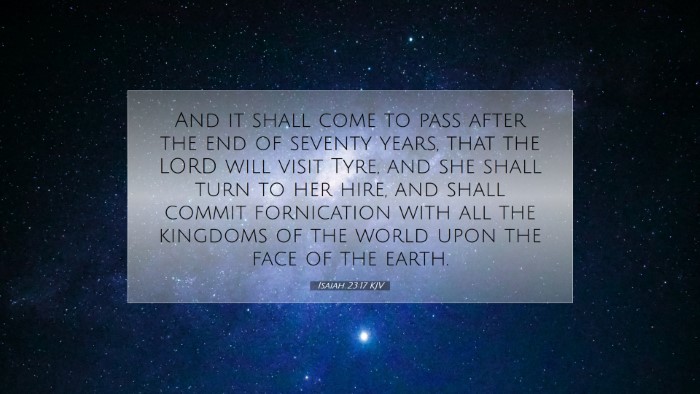Commentary on Isaiah 23:17
Isaiah 23:17 states: "And it shall come to pass after the end of seventy years, that the Lord will visit Tyre, and she shall turn to her hire, and shall commit fornication with all the kingdoms of the world upon the face of the earth." This verse marks a pivotal point in the prophet Isaiah's prophetic writings, focusing on Tyre's destiny and the broader implications for nations involved in commerce and idolatry.
Contextual Background
The prophecy concerning Tyre must be understood within the historical context of Israel and the surrounding nations. Tyre was a significant Phoenician city-state known for its wealth and maritime prowess. Throughout Isaiah, Tyre represents not just a city but an archetype of worldly ambition, commercial enterprise, and the seduction of foreign alliances.
Insights from Matthew Henry
According to Matthew Henry, this prophecy is a dual-edged sword that reveals both judgment and hope. The reference to the "end of seventy years" indicates a set period of divine chastisement but also restoration. Henry interprets this as God’s plan to redeem and re-establish Tyre after a time of correction, suggesting that divine discipline always aims towards restoration.
The Nature of Divine Discipline
- Divine Sovereignty: Henry emphasizes God's sovereignty over nations, indicating that He orchestrates events according to His divine purpose.
- The Purpose of Judgment: The seventy-year period symbolizes a definitive time for reflection and repentance.
- Hope for Restoration: After judgment, there remains the promise of turning back to God, illustrating that God's ultimate desire is reconciliation.
Albert Barnes' Perspective
Albert Barnes expands on the themes of spiritual prostitution and idolatry. He notes that Tyre’s economic relationships with surrounding kingdoms are akin to a form of fornication—illustrating how the pursuit of wealth and status can lead a nation away from its covenant with God.
Lessons on Idolatry and Commerce
- Erosion of Spiritual Integrity: Barnes warns that the allure of commerce can erode spiritual values and lead to a degradation of national character.
- Global Influence: The idea that Tyre would "commit fornication with all the kingdoms of the world" serves as a warning against the dangers of excessive alliances and compromises that lead away from true worship.
- The Interrelationship of Nations: Barnes highlights how nations are interconnected, and that the moral failing of one can impact many.
Adam Clarke's Analysis
Adam Clarke provides a thorough examination of the implications of this prophecy regarding Tyre's future. He posits that Tyre’s fall was inevitable due to its reliance on worldly wisdom and power, which ultimately do not align with God’s purposes.
Implications for Today’s Believers
- Worldliness vs. Faithfulness: Clarke suggests that believers today must guard against the seductions of modern commerce and politics that distract from their faith.
- The Consequences of Unfaithfulness: He draws parallels between Tyre's unfaithfulness and the potential pitfalls for contemporary nations, urging vigilance and fidelity to God's covenant.
- Redemption is Possible: Clarke reminds us of the hope that exists after judgment, including the prospect of return and restoration to spiritual integrity.
Theological Themes
This verse encapsulates several key theological themes for reflection by pastors, theologians, and scholars:
- The Nature of God’s Judgment: Understanding God's judgment as intentional and restorative rather than arbitrary.
- Human Free Will and Responsibility: The role of human choice in leading nations towards or away from God.
- The Call to Holiness: The necessity for believers to avoid the spiritual adulteries that come from conforming to the patterns of this world.
Conclusion
Isaiah 23:17 serves not only as a historical prophecy concerning Tyre but also as a timeless reminder of God's sovereignty over nations and the dangers of straying from faithfulness. The insights drawn from esteemed public domain commentaries by Matthew Henry, Albert Barnes, and Adam Clarke provide a rich tapestry of understanding that challenges and encourages contemporary readers to remain vigilant in their relationship with God amidst the influences of the world.


